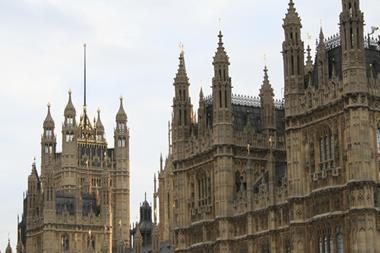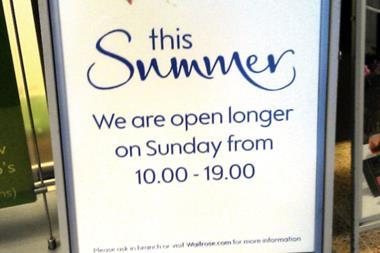The Association of Convenience Stores has called on MPs to reject an amendment tabled in the Enterprise Bill on the devolution of Sunday trading rules to local authorities, while retailers have warned that the measures could be the “straw that breaks the camel’s back”.
The Department for Business published its response to the consultation this morning (Tuesday), summarising over 7,000 responses in what the ACS described as a “12-page advocacy document for liberalisation”.
In the official Department for Business press release on Sunday Trading, also published this morning, the government justifies its decision to devolve Sunday trading hours to local authorities by citing a 5% rise in turnover as a result of liberalisation in Sweden. However, the figures they question are from 1972 to 1989.
“For the government to use figures from the 1970s to justify its decision on Sunday Trading is frankly embarrassing.”
ACS chief executive James Lowman
ACS chief executive James Lowman said: “The government is attempting to hoodwink the rest of Parliament into accepting these proposals by publishing only the parts of the consultation response that suit its agenda. The voice of thousands of businesses, communities, shop workers and other organisations has been ignored.
“For the government to use figures from the 1970s to justify its decision on Sunday Trading is frankly embarrassing. Parliament must reject this amendment being snuck into the late stages of the Enterprise Bill. The government’s message on Sunday trading has become so confused that it is barely recognisable. They claim that Sunday trading rules need to change to meet the needs of modern consumers, and yet quote decades old figures.
”They claim that Sunday trading changes will help high streets compete with online retail, but not one consumer or company polled this year has claimed that Sunday trading hours are a factor in the popularity of online shopping. They claim that this is what people want, despite several surveys showing that the majority of the public like the rules just the way they are. These ill thought out, badly executed and potentially devastating plans must be dropped.”
Retailers have also slammed the move. Mike Blowing, owner of Spar Kingshill, Buckinghamshire, said: “The growing number of multiple grocer-owned c-stores and the introduction of the National Minimum Wage have already had a crippling impact; lifting Sunday trading restrictions could be the straw that breaks the camel’s back.
“When our store opened more than 15 years ago, we were the only one open on Sundays for eight miles; now there are six. We used to make £1,100 on Sundays, but now take £550. With multiple c-stores taking 15% of business I dread to think what the effect will be on c-stores across the country.”
David Nice, who owns Nisa stores in Maylandsea and Canvey Island, Essex, said: “I just don’t understand the decision. It feels like the government doesn’t care about small businesses. By giving big businesses this opportunity they are robbing c-stores of Sunday trade which some stores rely on to survive.
“Retailers must stick together and be vocal to their local MPs and campaign against the decision. If it is passed it will force some stores to close while devaluing local shopping parades.”
Edward White, of Spar Calver, Derbyshire, added: “The only outcome is damaging for local trade and independent businesses which are going to be the hardest hit with added competition from the multiples.”
Retailers urged to lobby MPs
The ACS has called on retailers to put pressure on local MPs. Chief executive James Lowman said: “We are encouraging retailers to continue writing to their MPs highlighting the damage that these plans will do to their business ahead of the next stage of the Enterprise Bill, which is due in Parliament in the coming weeks.
“We cannot allow this unpopular, unnecessary and damaging legislation to be forced through when it did not feature in the Conservative manifesto, and when there is such strong opposition.”






















2 Readers' comments